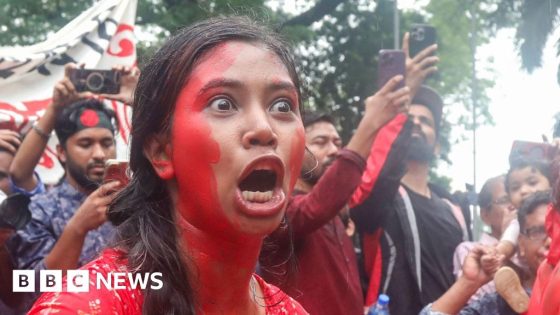Bangladesh is tense as both anti-government protesters and the governing Awami League are set to hold rallies across the country on Sunday.
The demonstrations are happening in the aftermath of deadly violence during protests last month over quotas in civil service jobs, in which more than 200 people were killed.
Around 10,000 people have been reportedly detained in a major crackdown by security forces in the past two weeks. Those arrested included opposition supporters and students.
Students Against Discrimination, a group behind the anti-government demonstrations, has called on prime minister Sheikh Hasina to step down.
The group has announced a nationwide disobedience movement starting from Sunday, urging citizens not to pay taxes or any utility bills. The students have also called for a shutdown of all factories and public transport.
The Awami League, the party of Ms Hasina, is also holding marches across the country on Sunday.
With both sides set to hold rallies there are concerns that there could be further violence.
The next few days are seen as crucial for both camps.
“Sheikh Hasina should not only resign, there should be a trial for the killings, looting and corruption,” Nahid Islam, one of the student movement’s leaders, told thousands of people at a gathering on Saturday in Dhaka.
The protests pose a momentous challenge to Ms Hasina, who was elected for a fourth consecutive term in January elections, boycotted by the main opposition.
Students took to the streets last month over the reservation of many civil service jobs for relatives of the veterans of Bangladesh’s independence war with Pakistan in 1971.
Most of the quota has now been scaled back by the government following a government ruling, but students have continued to protest, demanding justice for those killed and injured. Now they want Ms Hasina to step down.
Supporters of Ms Hasina have ruled out her resignation.
Earlier, Ms Hasina offered unconditional dialogue with the student leaders, saying she wanted the violence to end.
“I want to sit with the agitating students of the movement and listen to them. I want no conflict,” she said.
But the student protesters have rejected her offer.
Ms Hasina called in the military last month to restore order after several police stations and state buildings were set on fire during the protests.
The Bangladeshi army chief, General Waker-Uz-Zaman, held a meeting with junior officers in Dhaka to assess the security situation.
“Bangladesh Army has always stood by the people and will continue to do so for the interest of people and in any need of the state,” Gen Zaman said, according to a release by the Inter Services Public Relation Directorate.
The protests have restarted in several cities and the government is struggling to control the rising tide of anger over how it initially responded to the demonstrations.
Bangladeshi media says most of those killed in last month’s protests were shot dead by police. Thousands were injured.
The government argues that police opened fire only in self-defence and to protect state properties.
Source Agencies



